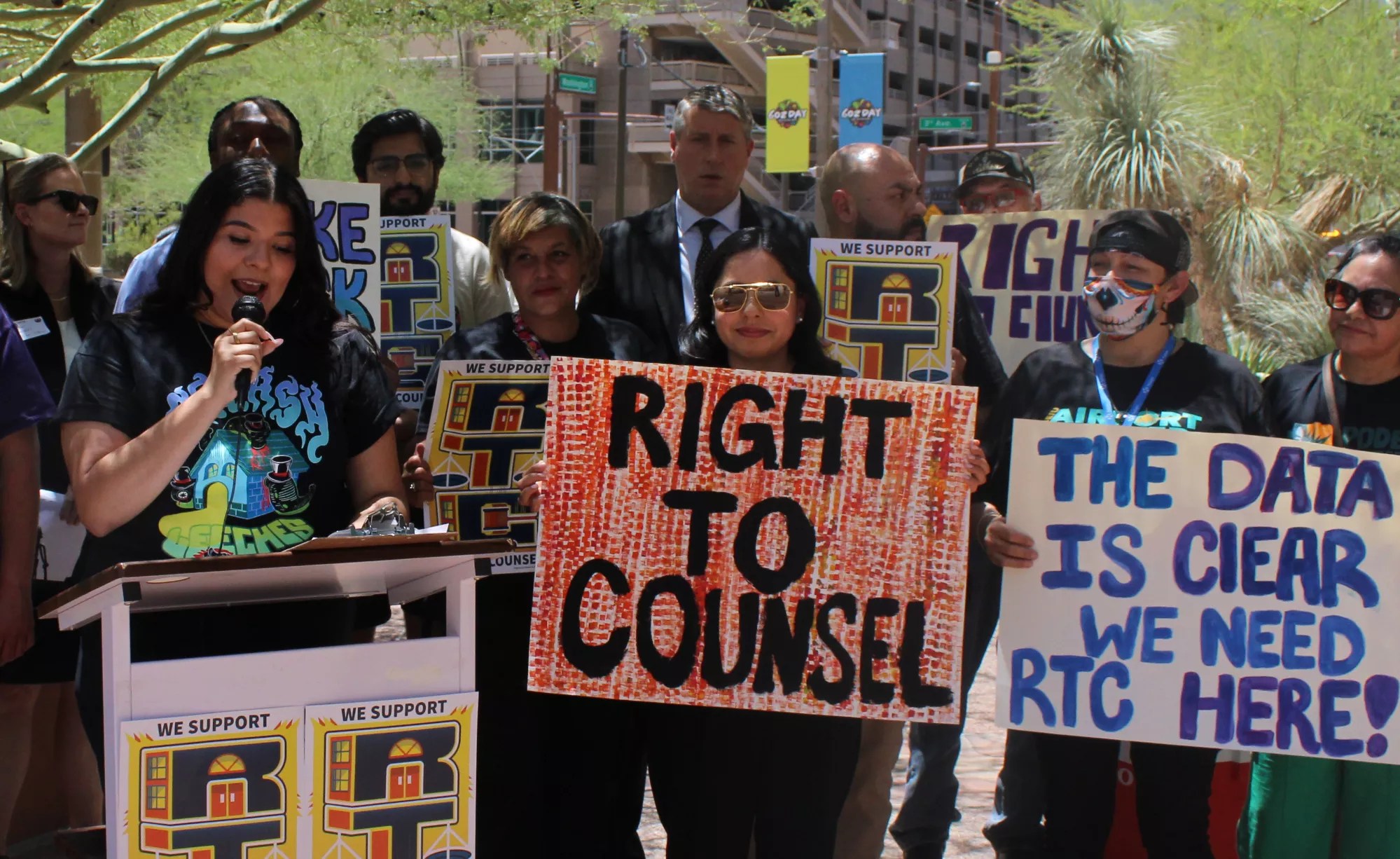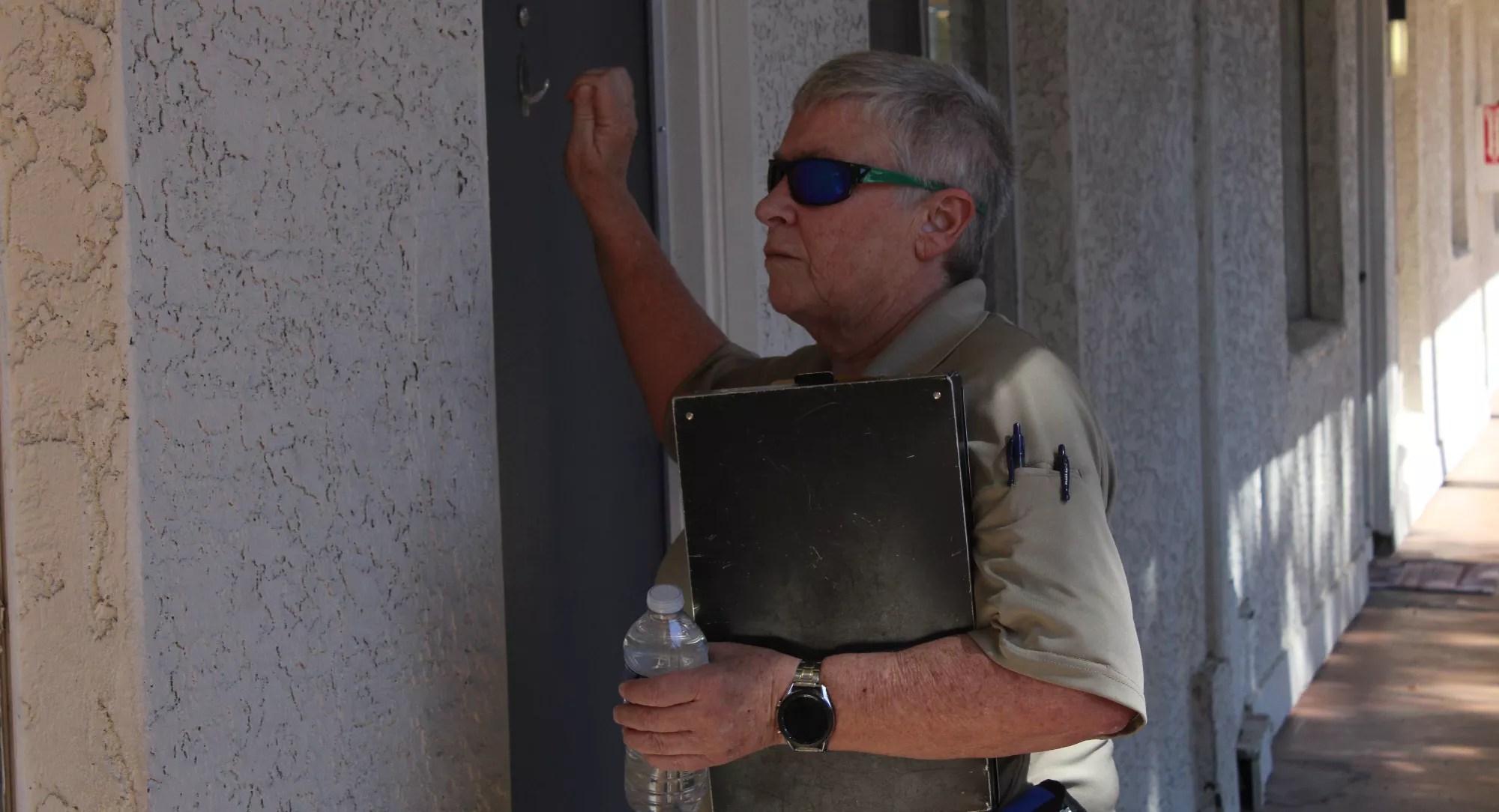
Morgan Fischer

Audio By Carbonatix
One weekday morning last month, Karyn Lathan steered a white SUV into a parking lot. Throwing the car into park, she took out a black clipboard brimming with legal documents. She flipped through the stack, pulling out one for the address of the quiet apartment complex in front of her.
“JUDGMENT FOR EVICTION,” it read at the top of the page.
Lathan was here to remove someone from their home. She was elected as Maricopa County constable for the University Lakes precinct in Tempe in 2018 and reelected in 2022, and likes to think of herself as “the community constable.” She dresses down to look less like a cop. She helps connect evicted tenants to social services. She brings Beanie Babies to hand out to kids.
“I’m that cushion between housed and unhoused,” she said. “Not all people or constables are the cushion.”
Sliding her finger down the page of a document listing this tenant’s financial debts, she lingered on a figure – not the unpaid rent, but $357 in attorneys’ fees. Sometimes, those are what get you. Tenants may miss only a month or two of rent payments, but fighting eviction proceedings costs money, too. Losing costs more. Many tenants don’t have a lawyer when they show up in court. Whose attorney’s fees were they ordered to pay?
Their landlord’s.
Maricopa County is in the midst of an eviction crisis, breaking a record with more than 87,000 evictions filed last year. Only 0.2% of tenants in eviction court have an attorney, while nearly every landlord does. That means many of those tossed out on the streets are caught in a cruel catch-22 – they could really use a lawyer, but they can’t afford one. If they could, they probably would have paid their rent.
Lathan can offer all sorts of assistance, but she can’t provide an evicted tenant with legal representation, the importance of which is hard to overstate. Recent data show that access to an attorney in eviction court can keep more people in their homes and decrease crime, homelessness and heat-related hospitalizations. Unsurprisingly, the Valley is also in the middle of a homelessness and heat-related death crisis.
“We are at a turning point, a breaking point,” said Drew Schaffer, the executive director of the William E. Morris Institute for Justice.
It doesn’t have to be this way, housing advocates say. Or at least, it doesn’t have to be this bad. A host of other cities have right-to-counsel programs, ensuring that low-income tenants facing eviction benefit from guaranteed representation in court.
Those programs make a concrete difference, according to the National Coalition for a Civil Right to Counsel.
After Philadelphia launched its right-to-counsel program in 2022, evictions went down. Notably, tenants with legal representation were more than twice as likely to obtain a favorable judgment as unrepresented ones. The program is estimated to save the city $45.2 million annually. The global investment bank Stout found that evictions in Cleveland dropped by 25% after it enacted its own program. San Francisco cut evictions by 10% in the same way. Delaware (22% drop) and Connecticut (11%) also trimmed eviction filings by passing statewide right-to-counsel programs.
But Phoenix, which saw 37,000 eviction filings in 2024, doesn’t have one. That may soon change – sort of.
This year, the Phoenix City Council allocated $1.2 million in American Rescue Plan Act funds to provide civil legal aid for residents facing eviction. But that funding isn’t permanent – it expires next June – and Arizona is set to lose other federal funding that props up other civil legal aid resources. Right-to-counsel advocates called for Phoenix to dedicate permanent funding to such a program, but the Phoenix City Council included no such funding last month when it passed its $5 billion 2025-26 budget.
If Phoenix wants to stem evictions, and the downstream problems that come with them, advocates say more needs to be done.
“Housing stability is a foundation for success,” Schaffer said. “Without it, everything else falls apart.”

Maricopa County constable Karyn Lathan knocks on the door of a tenant she has evict.
Morgan Fischer
A first step
Losing your home isn’t just life-changing. It can be deadly.
In January, nearly 3,800 people were counted living on the streets in Maricopa County. Last year, more than 600 people died from heat-related causes, half of whom were homeless. Stout’s study found that a right-to-counsel program could keep 1,400 additional people off the streets. Nearly 130 heat-related hospitalizations could be avoided.
Three organizations provide legal aid to people facing eviction. Those groups get no state funding and rely on federal dollars that the Trump administration would like to claw back. One of them, Community Legal Services, is very effective at keeping people in their homes – CLS is able to halt an eviction 75% of the time, it says. But it and similar programs cannot help every person in need. CLS and Arizona’s other civil legal aid organizations, DNA People’s Legal Services and Southern Arizona Legal Aid, can accept only about half of the cases they receive.
“We have limited staff already to try to meet the need as best as we can,” said Pam Bridge, the advocacy director of Community Legal Services. “So if there are federal cuts, statewide, not just in Phoenix, it’ll be harder. More people may get evicted because they don’t have access to an attorney.”
To address that gap, the nonprofit labor advocacy organization Organized Power in Numbers and other groups have pushed for Phoenix to permanently invest in a right-to-counsel program. The benefits, the groups say, are clear. The Stout study found that a fully funded, $25 million right-to-counsel program could serve more than 16,000 Phoenix households and keep 27,000 people from experiencing “disruptive displacement.” Doing so would save the city $64.1 million a year that would otherwise be spent on programs to aid those without permanent housing.
OPIN organizer Sebastian Del Portillo thinks Phoenix is “far from that,” though “there’s a real intention to cover more people with attorneys at full representation from the city right now,” he said. Dedicating $1.2 million in pandemic relief funds to start a pilot program – the “first official commitment from the city,” Del Portillo said – is a step in the right direction.
In statements to Phoenix New Times, several Phoenix councilmembers expressed their support for the pilot program and the concept of a right-to-counsel program in general. Kesha Hodge Washington, who worked closely with OPIN on a right-to-counsel proposal, said she thinks the new program will “not only demonstrate the effectiveness of legal assistance, but also the need for a permanent solution.” Anna Hernandez called the new funding “a great first step” and said she’d “like to see a heavier investment into eviction prevention measures.” Vice Mayor Ann O’Brien said she’s “been a strong supporter of continuing this program” and is “fully committed to finding a permanent funding solution” in next year’s budget. Laura Pastor said the pilot will help the city “gather the data we need to shape a more permanent, effective program moving forward.”
Mayor Kate Gallego and councilmembers Jim Waring, Debra Stark, Betty Guardado and Kevin Robinson did not respond to a request for comment.
Del Portillo said right-to-counsel proponents are feeling “positive.” They plan to keep pushing the city for a permanent program, hoping eventually to secure $25 million in funding over a five-year term. “What we’re trying to do,” Del Portillo said, “is guarantee that (a right-to-counsel program is) systematic and long-term.”
Until then, though, plenty of residents will find someone like Lathan at their doors. If they get her, they’ll be lucky. She doesn’t act like a hard-ass, pounding on doors and hoisting people out by their collars. If a tenant leaves behind a key and a clean apartment, she asks property owners to keep evictions off their records. During a recent ride along with Lathan, that happened several times.
“I am not the landlord constable, I’m not the tenant constable. I am the community constable,” she said. “What is best for the community?”
Still, there’s no mistaking why she’s there. She may want to ease the blow of eviction, but there’s no avoiding it. The only question is how hard it hits.
After thumbing through her clipboard of legal papers in the apartment complex lot, Lathan approached the red door of one unit. She rapped her knuckles on the door four times. It’s time for the person inside to leave.
“Maricopa County Constable,” she shouted. “Open up the door, please.”